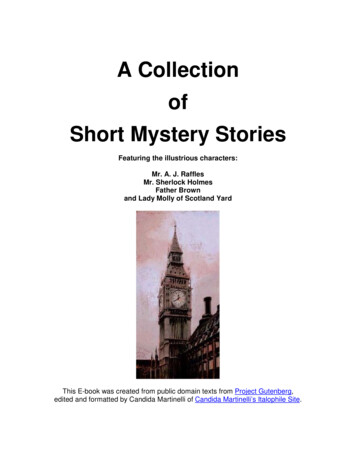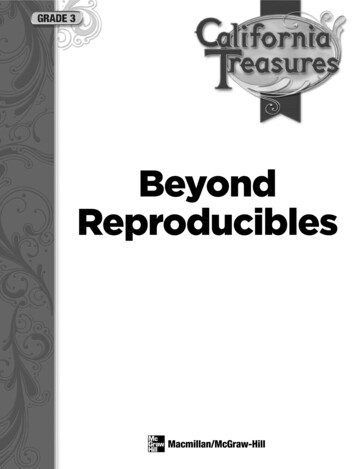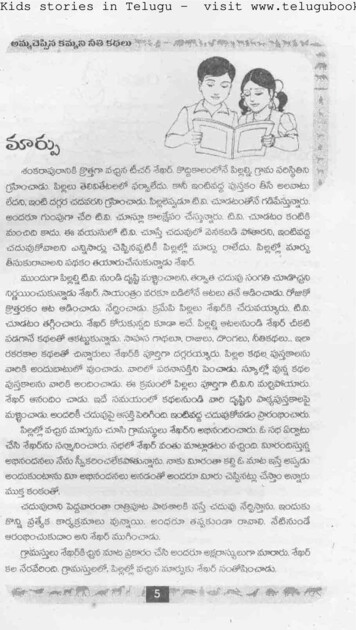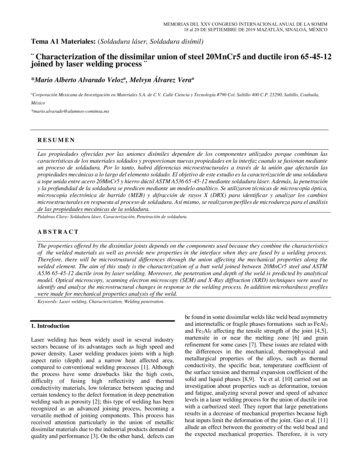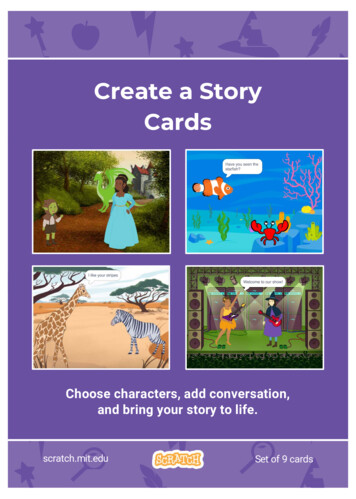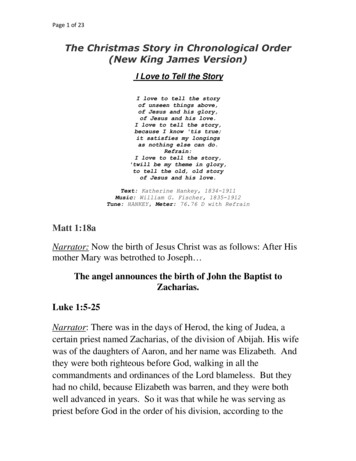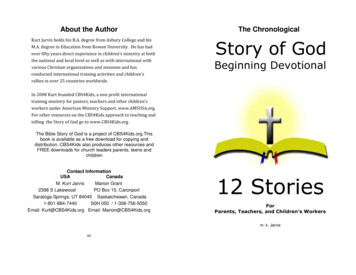
Transcription
Before ReadingThe Seventh ManShort Story by Haruki MurakamiCan you RECOVERfrom tragedy?RL 1 Cite evidence to supportinferences drawn from thetext. RL 4 Determine themeaning of words as they areused in the text. RL 5 Analyze anauthor’s choices concerning howto manipulate time and createtension or surprise. RL 6 Analyzea particular point of view reflectedin world literature.354We’ve all read stories in which a violent turn of events—a heartattack, a car crash, an earthquake—results in an individual’s suddendeath. But how do the survivors who are left behind recover? In“The Seventh Man,” the main character describes the troubles andtriumphs he experienced following a devastating childhood tragedy.QUICKWRITE With a group, list several tragic events that you knowabout from the news. Think about the lasting effects of the eventson the survivors. Select one event and write a paragraph aboutspecific resources or methods that you think might help the survivorsrecover from their difficult experiences.
Meet the Authortext analysis: foreshadowing and flashbackWhen crafting stories, writers often rely on two narrativetechniques to engage readers: foreshadowing and flashback. Foreshadowing is a writer’s use of hints or clues to indicatesituations that will occur later in a story. Writers often buildsuspense through foreshadowing. A flashback is an episode that interrupts the action of thestory’s plot to show an experience that happened at anearlier time. Writers usually provide important backgroundinformation in flashbacks.As you read “The Seventh Man,” notice how the author uses bothforeshadowing and flashback to build your interest in the story.reading strategy: monitorWhen you read, you should pause occasionally to check, ormonitor, your understanding of a story. As you read “TheSeventh Man,” use the following techniques to help youmonitor your own comprehension: Predicting: Predict what might happen next based ondetails in the story. Questioning: Ask yourself questions about ideas, events,and characters in the story.Use a chart like the one shown to jot down places in the storywhere you paused to make a prediction or ask a question.Passages Where I Paused to Check My UnderstandingPredictionsQuestionsReview: Visualizevocabulary in contextRestate each phrase below by substituting a different word orwords for the boldfaced term. Then, write a brief definition ofeach boldfaced word in your Reader/Writer Notebook.1. a vengeful act of savagery2. ominous dark shadows3. a delirium caused by fever4. a premonition of thefutureHaruki Murakamiborn 1949Affinity with the WestBorn to parents who were teachers ofliterature, Haruki Murakami (hä-rLPkCmMrQä-käPmC) grew up in Kyoto (kC-IPtI) andKobe (kIPbC), Japanese cities known for richeducational and cultural resources. An onlychild, Murakami often escaped loneliness andhis parents’ strictness by reading. As a teen,Murakami developed a taste for Westernliterature, favoring fiction by Leo Tolstoy, F.Scott Fitzgerald, and Truman Capote overtraditional Japanese works. Today, he is abest-selling author whose novels and storiesare valued for the way they elegantly combineEastern and Western influences.Consumer CultureMurakami often writes about the spiritualemptiness experienced by the Japanese ofhis generation. In his youth, the Japanesewere poor but idealistic. That idealismdisappeared in the late 1960s, when Japanbecame a prosperous nation. In its placearose a society that looked for fulfillmentin consumption and found boredom anddisappointment instead.background to the storyTsunamis and TyphoonsJapan consists of four main islands andnumerous smaller ones. Because the rockunderlying these islands are constantlyshifting, Japan is subject to frequentearthquakes. When the earthquakes occurout at sea, they whip up tsunamis, or tidalwaves, which wreak havoc along the coast.The countryy also experiencesptyphoons, tropical sstormstormtomsthat producewindsuce high wiwindndssndand ocean surges.5. a farewell full ofsentimentAuthorrOnline6. a reconciliation betweenenemiesGo to thinkcentral.com.nkcentral.c.comom.KEYWORD:D: HML10-3555Complete the activities in your Reader/Writer Notebook.355
The Seventh ManHaruki Murakami1020“A huge wave nearly swept me away,” said the seventh man, almost whispering.“It happened one September afternoon when I was ten years old.”The man was the last one to tell his story that night. The hands of the clockhad moved past ten. The small group that huddled in a circle could hear thewind tearing through the darkness outside, heading west. It shook the trees, setthe windows to rattling, and moved past the house with one final whistle. a“It was the biggest wave I had ever seen in my life,” he said. “A strange wave.An absolute giant.”He paused.“It just barely missed me, but in my place it swallowed everything thatmattered most to me and swept it off to another world. I took years to findit again to recover from the experience—precious years that can never bereplaced.”The seventh man appeared to be in his mid-fifties. He was a thin man, tall,with a moustache, and next to his right eye he had a short but deep-lookingscar that could have been made by the stab of a small blade. Stiff, bristlypatches of white marked his short hair. His face had the look you see onpeople when they can’t quite find the words they need. In his case, though, theexpression seemed to have been there from long before, as though it were partof him. The man wore a simple blue shirt under a grey tweed coat, and everynow and then he would bring his hand to his collar. None of those assembledthere knew his name or what he did for a living.He cleared his throat, and for a moment or two his words were lost insilence. The others waited for him to go on.“In my case, it was a wave,” he said. “There’s no way for me to tell, ofcourse, what it will be for each of you. But in my case it just happened to takethe form of a gigantic wave. It presented itself to me all of a sudden one day,without warning. And it was devastating.” b356unit 3: narrative devicesaMONITORWhy do you thinkthe man is called“the seventh man”?bFORESHADOWINGReread lines 1–28. Whichdetails suggest that youwill learn more about theman’s past?Katsura Moonlight (1982), Clifton Karhu. 30/100.Woodblock, 40 30 cm. The Tolman Collection, Tokyo.
3040506070grew up in a seaside town in the Province of S. It was such a smalltown, I doubt that any of you would recognize the name if I wereto mention it. My father was the local doctor, and so I led a rathercomfortable childhood. Ever since I could remember, my bestfriend was a boy I’ll call K. His house was close to ours, and he was a gradebehind me in school. We were like brothers, walking to and from schooltogether, and always playing together when we got home. We never oncefought during our long friendship. I did have a brother, six years older, butwhat with the age difference and differences in our personalities, we were neververy close. My real brotherly affection went to my friend K. cK. was a frail, skinny little thing, with a pale complexion and a face almostpretty enough to be a girl’s. He had some kind of speech impediment,1 though,which might have made him seem retarded to anyone who didn’t know him.And because he was so frail, I always played his protector, whether at school orat home. I was kind of big and athletic, and the other kids all looked up to me.But the main reason I enjoyed spending time with K. was that he was such asweet, pure-hearted boy. He was not the least bit retarded, but because of hisimpediment, he didn’t do too well at school. In most subjects, he could barelykeep up. In art class, though, he was great. Just give him a pencil or paintsand he would make pictures that were so full of life that even the teacher wasamazed. He won prizes in one contest after another, and I’m sure he wouldhave become a famous painter if he had continued with his art into adulthood.He liked to do seascapes. He’d go out to the shore for hours, painting. I wouldoften sit beside him, watching the swift, precise movements of his brush,wondering how, in a few seconds, he could possibly create such lively shapesand colors where, until then, there had been only blank white paper. I realizenow that it was a matter of pure talent. dOne year, in September, a huge typhoon hit our area. The radio said it wasgoing to be the worst in ten years. The schools were closed, and all the shopsin town lowered their shutters in preparation for the storm. Starting early inthe morning, my father and brother went around the house nailing shut all thestorm doors, while my mother spent the day in the kitchen cooking emergencyprovisions. We filled bottles and canteens with water, and packed our mostimportant possessions in rucksacks2 for possible evacuation. To the adults,typhoons were an annoyance and a threat they had to face almost annually,but to the kids, removed as we were from such practical concerns, it was justa great big circus, a wonderful source of excitement.Just after noon the color of the sky began to change all of a sudden. Therewas something strange and unreal about it. I stayed outside on the porch,watching the sky, until the wind began to howl and the rain began to beatagainst the house with a weird dry sound, like handfuls of sand. Then weclosed the last storm door and gathered together in one room of the darkenedhouse, listening to the radio. This particular storm did not have a great dealI1. speech impediment: an obstacle to speaking clearly, such as a lisp or stammer.2. rucksacks: knapsacks.358unit 3: narrative devicescFLASHBACKIn lines 29–38, whatinformation interruptsthe present action ofthe story? Explain.dMONITORWhy do you thinkthe narrator choosesto befriend K.?
Sudden Shower over Shin-Ohashi Bridge and Atake (1800’s), Ando Hiroshige or Utagawa. Plate 58from One Hundred Famous Views of Edo. Woodblock color print. Brooklyn Museum of Art,Brooklyn, New York. Photo Bridgeman Art Library.of rain, it said, but the winds were doing a lot of damage, blowing roofs offhouses and capsizing ships. Many people had been killed or injured by flyingdebris. Over and over again, they warned people against leaving their homes.Every once in a while, the house would creak and shudder as if a huge handwere shaking it, and sometimes there would be a great crash of some heavysounding object against a storm door. My father guessed that these were tilesblowing off the neighbors’ houses. For lunch we ate the rice and omelettes mymother had cooked, waiting for the typhoon to blow past.the seventh man359
8090100110120But the typhoon gave no sign of blowing past. The radio said it had lostmomentum almost as soon as it came ashore at S. Province, and now it wasmoving north-east at the pace of a slow runner. The wind kept up its savagehowling as it tried to uproot everything that stood on land.Perhaps an hour had gone by with the wind at its worst like this when ahush fell over everything. All of a sudden it was so quiet, we could hear a birdcrying in the distance. My father opened the storm door a crack and lookedoutside. The wind had stopped, and the rain had ceased to fall. Thick, greyclouds edged across the sky, and patches of blue showed here and there. Thetrees in the yard were still dripping their heavy burden of rainwater.“We’re in the eye of the storm,” my father told me. “It’ll stay quiet like thisfor a while, maybe fifteen, twenty minutes, kind of like an intermission. Thenthe wind’ll come back the way it was before.”I asked him if I could go outside. He said I could walk around a little if I didn’tgo far. “But I want you to come right back here at the first sign of wind.” eI went out and started to explore. It was hard to believe that a wild stormhad been blowing there until a few minutes before. I looked up at the sky.The storm’s great “eye” seemed to be up there, fixing its cold stare on all of usbelow. No such “eye” existed, of course: we were just in that momentary quietspot at the center of the pool of whirling air.While the grown-ups checked for damage to the house, I went down to thebeach. The road was littered with broken tree branches, some of them thickpine boughs that would have been too heavy for an adult to lift alone. Therewere shattered roof tiles everywhere, cars with cracked windshields, and evena doghouse that had tumbled into the middle of the street. A big hand mighthave swung down from the sky and flattened everything in its path.K. saw me walking down the road and came outside.“Where are you going?” he asked.“Just down to look at the beach,” I said.Without a word, he came along with me. He had a little white dog thatfollowed after us.“The minute we get any wind, though, we’re going straight back home,”I said, and K. gave me a silent nod. fThe shore was a 200-yard walk from my house. It was lined with a concretebreakwater—a big dyke3 that stood as high as I was tall in those days. We hadto climb a short flight of steps to reach the water’s edge. This was where wecame to play almost every day, so there was no part of it we didn’t know well.In the eye of the typhoon, though, it all looked different: the color of the skyand of the sea, the sound of the waves, the smell of the tide, the whole expanseof the shore. We sat atop the breakwater for a time, taking in the view withouta word to each other. We were supposedly in the middle of a great typhoon,and yet the waves were strangely hushed. And the point where they washedagainst the beach was much farther away than usual, even at low tide. The3. dyke: a barrier built along the edge of a body of water to prevent flooding.360unit 3: narrative deviceseFORESHADOWINGReread lines 93–94.How does the father’swarning build suspense,or excitement?fMONITORPredict what mighthappen next to thenarrator and K.
130140150160white sand stretched out before us as far as we could see. The whole, hugespace felt like a room without furniture, except for the band of flotsam4 thatlined the beach.We stepped down to the other side of the breakwater and walked along thebroad beach, examining the things that had come to rest there. Plastic toys,sandals, chunks of wood that had probably once been parts of furniture, piecesof clothing, unusual bottles, broken crates with foreign writing on them, andother, less recognizable items: it was like a big candy store. The storm musthave carried these things from very far away. Whenever something unusualcaught our attention, we would pick it up and look at it every which way, andwhen we were done, K.’s dog would come over and give it a good sniff. gWe couldn’t have been doing this more than five minutes when I realizedthat the waves had come up right next to me. Without any sound or otherwarning, the sea had suddenly stretched its long, smooth tongue out to whereI stood on the beach. I had never seen anything like it before. Child though Iwas, I had grown up on the shore and knew how frightening the ocean couldbe—the savagery with which it could strike unannounced.nd so I had taken care to keep well back from the waterline. In spiteof that, the waves had slid up to within inches of where I stood. Andthen, just as soundlessly, the water drew back—and stayed back.The waves that had approached me were as unthreatening as wavescan be—a gentle washing of the sandy beach. But something ominous aboutthem—something like the touch of a reptile’s skin—had sent a chill down myspine. My fear was totally groundless—and totally real. I knew instinctively thatthey were alive. They knew I was here and they were planning to grab me. Ifelt as if some huge, man-eating beast were lying somewhere on a grassy plain,dreaming of the moment it would pounce and tear me to pieces with its sharpteeth. I had to run away.“I’m getting out of here!” I yelled to K. He was maybe ten yards down thebeach, squatting with his back to me, and looking at something. I was sure Ihad yelled loud enough, but my voice did not seem to have reached him. Hemight have been so absorbed in whatever it was he had found that my callmade no impression on him. K. was like that. He would get involved withthings to the point of forgetting everything else. Or possibly I had not yelledas loudly as I had thought. I do recall that my voice sounded strange to me, asthough it belonged to someone else.Then I heard a deep rumbling sound. It seemed to shake the earth. Actually,before I heard the rumble I heard another sound, a weird gurgling as thougha lot of water was surging up through a hole in the ground. It continued fora while, then stopped, after which I heard the strange rumbling. Even thatwas not enough to make K. look up. He was still squatting, looking down atAgGRAMMAR AND STYLEReread lines 126–133.To highlight the boys’intense curiosity,Murakami uses a simileto compare the litteredbeach to a candy store.savagery (sBvPGj-rC) n.extreme violence or crueltyominous (JmPE-nEs) adj.menacing; threatening4. flotsam: refuse or debris from a ship.the seventh man361
170180190200something at his feet, in deep concentration. He probably did not hear therumbling. How he could have missed such an earth-shaking sound, I don’tknow. This may seem odd, but it might have been a sound that only I couldhear—some special kind of sound. Not even K.’s dog seemed to notice it, andyou know how sensitive dogs are to sound.I told myself to run over to K., grab hold of him, and get out of there. Itwas the only thing to do. I knew that the wave was coming, and K. didn’tknow. As clearly as I knew what I ought to be doing, I found myself runningthe other way—running full speed toward the dyke, alone. What made me dothis, I’m sure, was fear, a fear so overpowering it took my voice away and setmy legs to running on their own. I ran stumbling along the soft sand beach tothe breakwater, where I turned and shouted to K.“Hurry, K.! Get out of there! The wave is coming!” This time my voiceworked fine. The rumbling had stopped, I realized, and now, finally, K. heardmy shouting and looked up. But it was too late. A wave like a huge snakewith its head held high, poised to strike, was racing towards the shore. I hadnever seen anything like it in my life. It had to be as tall as a three-story building.Soundlessly (in my memory, at least, the image is soundless), it rose up behind K.to block out the sky. K. looked at me for a few seconds, uncomprehending. Then,as if sensing something, he turned towards the wave. He tried to run, but nowthere was no time to run. In the next instant, the wave had swallowed him. hThe wave crashed on to the beach, shattering into a million leaping wavesthat flew through the air and plunged over the dyke where I stood. I wasable to dodge its impact by ducking behind the breakwater. The spray wetmy clothes, nothing more. I scrambled back up on to the wall and scannedthe shore. By then the wave had turned and, with a wild cry, it was rushingback out to sea. It looked like part of a gigantic rug that had been yanked bysomeone at the other end of the earth. Nowhere on the shore could I find anytrace of K., or of his dog. There was only the empty beach. The receding wavehad now pulled so much water out from the shore that it seemed to expose theentire ocean bottom. I stood along on the breakwater, frozen in place.The silence came over everything again—a desperate silence, as thoughsound itself had been ripped from the earth. The wave had swallowed K. anddisappeared into the far distance. I stood there, wondering what to do. ShouldI go down to the beach? K. might be down there somewhere, buried in thesand . . . But I decided not to leave the dyke. I knew from experience that bigwaves often came in twos and threes. iI’m not sure how much time went by—maybe ten or twenty seconds ofeerie emptiness—when, just as I had guessed, the next wave came. Anothergigantic roar shook the beach, and again, after the sound had faded, anotherhuge wave raised its head to strike. It towered before me, blocking out thesky, like a deadly cliff. This time, though, I didn’t run. I stood rooted to thesea wall, entranced, waiting for it to attack. What good would it do to run, I362unit 3: narrative devicesExamine the illustration.How does this image of agreat wave compare withyour mental picture of thewave in the story?hMONITORWhat has happened to K.?Explain.iFORESHADOWINGReread lines 185–200.Which details foreshadowthe appearance ofanother wave?Detail of Under the Wave off Kanagawa, Hokusai. Historical Picture Archive/Corbis.
210220230thought, now that K. had been taken? Or perhaps I simply froze, overcomewith fear. I can’t be sure what it was that kept me standing there.The second wave was just as big as the first—maybe even bigger. Fromfar above my head it began to fall, losing its shape, like a brick wall slowlycrumbling. It was so huge that it no longer looked like a real wave. It was likesomething from another, far-off world, that just happened to assume the shapeof a wave. I readied myself for the moment the darkness would take me. I didn’teven close my eyes. I remember hearing my heart pound with incredible clarity.The moment the wave came before me, however, it stopped. All at onceit seemed to run out of energy, to lose its forward motion and simply hoverthere, in space, crumbling in stillness. And in its crest,5 inside its cruel,transparent tongue, what I saw was K.Some of you may find this impossible to believe, and if so, I don’t blameyou. I myself have trouble accepting it even now. I can’t explain what I sawany better than you can, but I know it was no illusion, no hallucination. I amtelling you as honestly as I can what happened at that moment—what reallyhappened. In the tip of the wave, as if enclosed in some kind of transparentcapsule, floated K.’s body, reclining on its side. But that is not all. K. waslooking straight at me, smiling. There, right in front of me, so close that Icould have reached out and touched him, was my friend, my friend K. who,only moments before, had been swallowed by the wave. And he was smilingat me. Not with an ordinary smile—it was a big, wide-open grin that literallystretched from ear to ear. His cold, frozen eyes were locked on mine. He wasno longer the K. I knew. And his right arm was stretched out in my direction,as if he were trying to grab my hand and pull me into that other world wherehe was now. A little closer, and his hand would have caught mine. But, havingmissed, K. then smiled at me one more time, his grin wider than ever. jseem to have lost consciousness at that point. The next thing I knew,I was in bed in my father’s clinic. As soon as I awoke the nurse wentto call my father, who came running. He took my pulse, studied mypupils, and put his hand on my forehead. I tried to move my arm,but couldn’t lift it. I was burning with fever, and my mind was clouded. I hadbeen wrestling with a high fever for some time, apparently. “You’ve been asleepfor three days,” my father said to me. A neighbor who had seen the whole thinghad picked me up and carried me home. They had not been able to find K.I wanted to say something to my father. I had to say something to him. Butmy numb and swollen tongue could not form words. I felt as if some kind ofcreature had taken up residence in my mouth. My father asked me to tell himmy name, but before I could remember what it was, I lost consciousness again,sinking into darkness.I2405. crest: the top of a wave.364unit 3: narrative devicesRL 4Language CoachMultiple MeaningsMany words have morethan one meaning.Reread the sentence inlines 211–213. Assume canmean “suppose,” “puton,” or “take control of.”Which meaning best fitsits use in this passage?Use assume this way in anew sentence.jMONITORWhat might explain thestrange image that thenarrator sees in the wave?
250260270280Altogether, I stayed in bed for a week on a liquid diet. I vomited severaltimes, and had bouts of delirium. My father told me afterwards that I was sobad that he had been afraid that I might suffer permanent neurological6 damagefrom the shock and high fever. One way or another, though, I managed torecover—physically, at least. But my life would never be the same again.They never found K.’s body. They never found his dog, either. Usually whensomeone drowned in that area, the body would wash up a few days later on theshore of a small inlet to the east. K.’s body never did. The big waves probablycarried it far out to sea—too far for it to reach the shore. It must have sunkto the ocean bottom to be eaten by the fish. The search went on for a verylong time, thanks to the cooperation of the local fishermen, but eventually itpetered out.7 Without a body, there was never any funeral. Half crazed, K.’sparents would wander up and down the beach every day, or they would shutthemselves up at home, chanting sutras.8As great a blow as this had been for them, though, K.’s parents never chidedme for having taken their son down to the shore in the midst of a typhoon.They knew how I had always loved and protected K. as if he had been my ownlittle brother. My parents, too, made a point of never mentioning the incidentin my presence. But I knew the truth. I knew that I could have saved K. if Ihad tried. I probably could have run over and dragged him out of the reachof the wave. It would have been close, but as I went over the timing of theevents in my memory, it always seemed to me that I could have made it. AsI said before, though, overcome with fear, I abandoned him there and savedonly myself. It pained me all the more that K.’s parents failed to blame meand that everyone else was so careful never to say anything to me about whathad happened. It took me a long time to recover from the emotional shock. Istayed away from school for weeks. I hardly ate a thing, and spent each day inbed, staring at the ceiling. kK. was always there, lying in the wave tip, grinning at me, his handoutstretched, beckoning. I couldn’t get that picture out of my mind. And whenI managed to sleep, it was there in my dreams—except that, in my dreams, K.would hop out of his capsule in the wave and grab my wrist to drag me backinside with him.And then there was another dream I had. I’m swimming in the ocean. It’sa beautiful summer afternoon, and I’m doing an easy breaststroke far fromshore. The sun is beating down on my back, and the water feels good. Then,all of a sudden, someone grabs my right leg. I feel an ice-cold grip on myankle. It’s strong, too strong to shake off. I’m being dragged down under thesurface. I see K.’s face there. He has the same huge grin, split from ear to ear,his eyes locked on mine. I try to scream, but my voice will not come. I swallowwater, and my lungs start to fill.I wake up in the darkness, screaming, breathless, drenched in sweat.delirium (dG-lîrPC-Em)n. a temporary state ofmental confusion usuallyresulting from high feveror shockkMONITORAs you reread lines234–274, question thenarrator’s reaction tothe tragedy. Do you thinkit is believable? Explain.6. neurological: relating to the nervous system.7. petered out: came to an end.8. sutras: short religious texts meant to be chanted.the seventh man365
290300310320330At the end of the year I pleaded with my parents to let me move to anothertown. I couldn’t go on living in sight of the beach where K. had been sweptaway, and my nightmares wouldn’t stop. If I didn’t get out of there, I’d gocrazy. My parents understood and made arrangements for me to live elsewhere.I moved to Nagano Province in January to live with my father’s family in amountain village near Komoro.9 I finished elementary school in Nagano andstayed on through junior and senior high school there. I never went home,even for holidays. My parents came to visit me now and then.I live in Nagano to this day. I graduated from a college of engineering in theCity of Nagano and went to work for a precision toolmaker in the area. I stillwork for them. I live like anybody else. As you can see, there’s nothing unusualabout me. I’m not very sociable, but I have a few friends I go mountainclimbing with. Once I got away from my hometown, I stopped havingnightmares all the time. They remained a part of my life, though. They wouldcome to me now and then, like debt collectors at the door. It happened when Iwas on the verge of forgetting. And it was always the same dream, down to thesmallest detail. I would wake up screaming, my sheets soaked with sweat.That is probably why I never married. I didn’t want to wake someonesleeping next to me with my screams in the middle of the night. I’ve been inlove with several women over the years, but I never spent a night with any ofthem. The terror was in my bones. It was something I could never share withanother person.I stayed away from my hometown for over forty years. I never went nearthat seashore—or any other. I was afraid that if I did, my dream might happenin reality. I had always enjoyed swimming, but after that day I never evenwent to swim in a pool. I wouldn’t go near deep rivers or lakes. I avoidedboats and wouldn’t take a plane to go abroad. Despite all these precautions, Icouldn’t get rid of the image of myself drowning. Like K.’s cold hand, this darkpremonition caught hold of my mind and refused to let go.hen, last spring, I finally revisited the beach where K. had beentaken by the wave.My father had died of cancer the year before, and my brother hadsold the old house. In going through the storage shed, he had founda cardboard carton crammed with childhood things of mine, which he sent tome in Nagano. Most of it was useless junk, but there was one bundle of picturesthat K. had painted and given to me. My parents had probably put them awayfor me as a keepsake of K., but the pictures did nothing but reawaken theold terror. They made me feel as if K.’s spirit would spring back to life fromthem, and so I quickly returned them to their paper wrapping, intending tothrow them away. I couldn’t make myself do it, though. After several d
best-selling author whose novels and stories are valued for the way they elegantly combine Eastern and Western influences. Consumer Culture Murakami often writes about the spiritual emptiness experienced by the Japanese of his generation. In his youth, the Japanese were poor but idealistic
